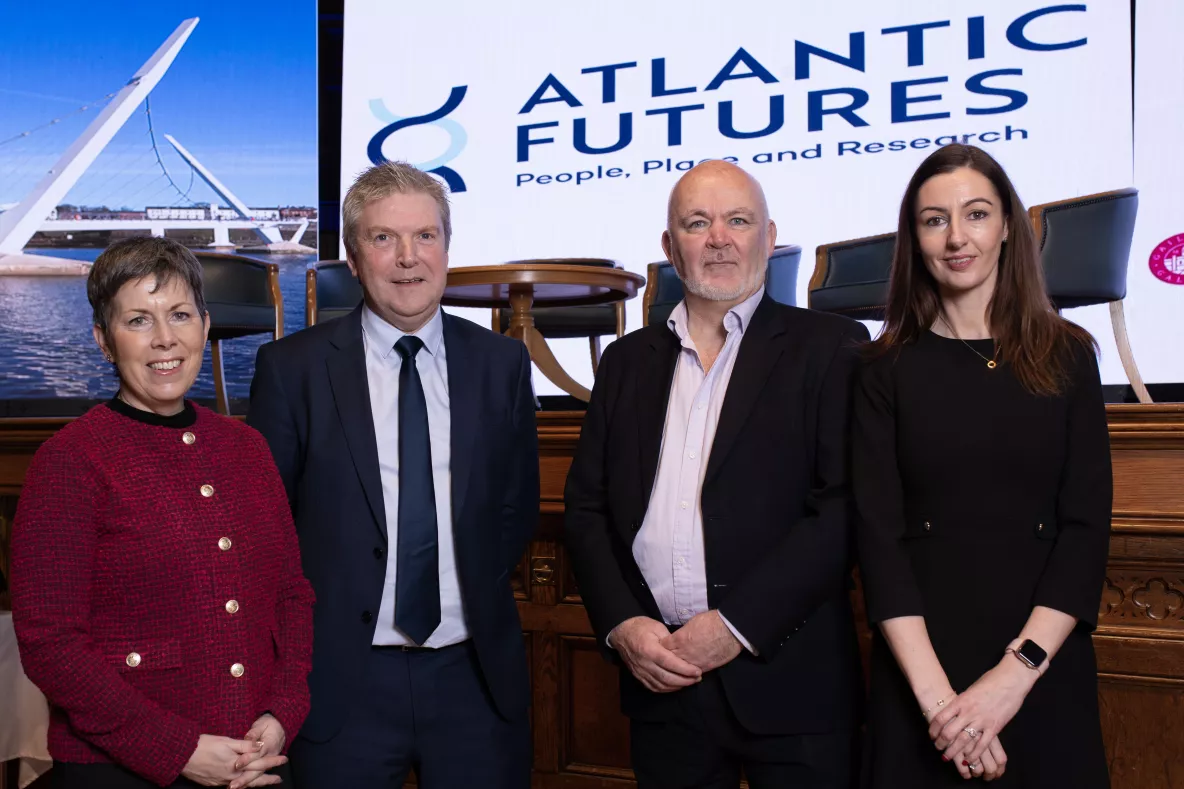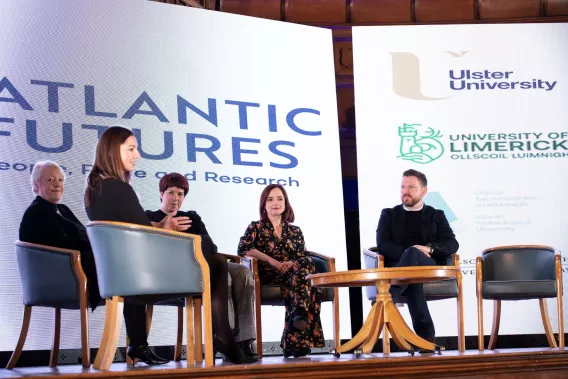
A major €4million four-year cross-border partnership involving University of Limerick has been launched to research and address structural and societal imbalances across the North-West Atlantic Innovation Corridor.
The Atlantic Futures Project is a collaboration between Ulster University, University of Galway, Atlantic Technological University and University of Limerick for sustainable regional development to make a real-world impact on aspects of industry and civic society in the North-West Atlantic Innovation Corridor region.
It was launched at an event in the Guildhall, Derry this Friday.
Announced in March, the flagship project has seen the creation of a research team organised in three co-located hubs in Derry/Londonderry, Galway and Limerick, working to understand and address issues which uniquely affect this section of the Atlantic corridor, namely: relative slow economic growth; low levels of female entrepreneurship; higher rates of mental health difficulties among young people than ever before; barriers to digitalisation in rural areas; and issues with international freight connectivity with no state ports or airports in the region.
The large-scale social science research will seek to examine these issues based on three themes with six working projects in order to face into and embrace digital, green and energy transitions and to focus efforts on societal, business and community outcomes:
- Theme 1: Innovation in Regional Context
Project I: comparing rural entrepreneurial ecosystems with those in small towns/cities to identify bottlenecks and work with agencies to take action
Project II: identifying successful management practices in scaling businesses and running masterclasses with organisations along the corridor
- Theme 2: Institutional and Cultural Factors – those that affect this region’s innovation opportunities:
Project I: fostering female entrepreneurship along the West Coast – looking at external factors that have impacted negatively (Brexit, COVID-19, lack of funding), partnering with female entrepreneurship programmes and delivering a mentorship programme
Project II: mental health as a public good – looking at new ways to respond to young people’s needs: developing new digital tools and early intervention in the community with partner agencies
- Theme 3: Technological and Infrastructural Opportunities and Challenges
Project I: Digitalisation: establishing the challenges and opportunities for digital transformation in rural areas and looking at the links between changing skills needs and regional innovation and economic performance to embrace digitalisation and inform policy
Project II: International freight connectivity in the North-West and its implications for regional competitiveness, outlining ways to enhance connectivity by road, rail and air.
Each project engages with partners in civil society, business, and government, with many major partners being involved across several projects.
Industry stakeholders and partner agency representatives such as InterTrade Ireland, Catalyst, the NI Mental Health Champion, Airporter, FTA Ireland, and Causeway Chamber will join with Derry’s Mayor Sandra Duffy to discuss these themes and explore solutions to challenges and the opportunities to maximise benefits for communities along the corridor.
Liam Maguire, PVC Research, Ulster University commented: “Atlantic Futures combines the significant research prowess of the four institutions to advance challenges in this distinct region. Our collective work aligns closely with national goals set out by both governments in the New Decade New Approach in Northern Ireland and the National Development Plan in the Republic of Ireland. Namely, of a regionally balanced economy which is common to both, a high-quality international transport connectivity (NDP) and exploring digital connectivity and infrastructure (NDNA). From our progressive Derry-Londonderry campus, we are uniquely placed to contribute to this regional partnership, through research that can drive forward practical solutions for the benefit of individuals, organisations and communities. We look forward to collaborating with our colleagues in Galway, Limerick and ATU.”
Jim Livesey, Vice-President Research and Innovation, University of Galway, said: “Our ambition is large and clear: we want Atlantic Futures to be recognised internationally for understanding what drives economic, social and cultural aspects of life in the region, on the edge of Europe. This project is a big responsibility and we want to see it make a tangible difference with research in action such as mentoring for female entrepreneurs and management masterclasses along with focus groups and information from the people who live and work in the region. This brand new cross-border data and the insights it uncovers will be shared with others carrying out similar work in Europe and beyond, to help inform similar programmes for sustainable regional development.”
Professor Norelee Kennedy, Vice President Research at University of Limerick said: “We want our research to have an impact in the area. We are working together to achieve four outcomes. They are the alignment of the research capacity of the leading research institutions along the west coast of the island of Ireland around the problems of transition and transformation in our shared region; development of a body of research to inform policy, co-created with relevant stakeholders addressing specific salient issues affecting the three city region; garnering new and robust insights into the developmental pathways for multi-city regional transformation; and understanding the role inter-cultural understanding and misunderstanding plays in cross-border collaboration and co-ordination.”
Dr Rick Officer, Vice President for Research and Innovation based at ATU’s Galway City campus is enthusiastic about the programme: “The Atlantic Futures programme will foster sustainable innovation along the island’s Atlantic coast, from the western counties of Northern Ireland and Donegal down to the Shannon Estuary. Atlantic Futures will focus on addressing challenges experienced by these areas, such as retention of local talent, over-reliance on foreign direct investment, and a lack of indigenous small and medium-sized enterprise growth. This Atlantic corridor has high-performing economic sectors such as the MedTech, FinTech and Advanced Manufacturing, but it also faces problems including housing, and persistent loss of talent to other regions.
“Previous models of economic and social transition have focused on metropolitan centres. Atlantic Futures differs in its focus. Our ambitious programme will take a multi-pronged approach to identifying obstacles to sustainable innovation in the region and ways to support its development. The programme focusses on how a complex, distributed, and multi-city region, such as the cross-border, west and north-west of Ireland, can successfully foster sustainable innovation.”
The North-South Research Programme is a collaborative scheme funded through the Government’s Shared Island Fund. It is being administered by the Higher Education Authority (HEA) on behalf of the Department of Further and Higher Education, Research, Innovation and Science.
